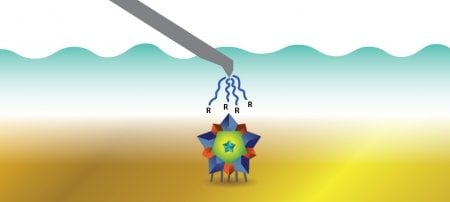After spending nearly four decades in the same place, Michigan Tech's new chair of Chemical Engineering is ready for a change, in more ways than one.
One of Pradeep Agrawal’s biggest challenges in his new job just might be finding suitable outerwear. The new chair of Michigan Technological University’s Department of Chemical Engineering, who began his duties on July 1, comes to Michigan Tech after nearly 40 years at the Georgia Institute of Technology.
He is philosophical about his new adventure. “I felt it was time to change gear for a colder climate. If the worst part of your job is the weather, you’ve got it pretty good,” he says.
In fact, a change of scenery was indeed one of the factors that led him to pull up stakes and make the more than 1,100 mile trek to Houghton. “There were several factors that contributed to my decision to move,” he says. “After 38 years at one place, regardless of how much one enjoys his job, it may seem stale. It is definitely a renewal of sorts for me personally, as well as a challenge professionally.”
But, Agrawal says he didn’t move here just for the sake of moving. “The students at Michigan Tech have a strong work ethic and are willing to work hard to succeed in one of the most challenging majors on any campus.” And, he says, Michigan Tech isn’t just any campus. “The university has excellent infrastructure for both the educational and research missions. I am honored and humbled at the same time to have an opportunity to build on the many strengths of the chemical engineering program at Michigan Tech.”
According to Agrawal, Tech places a strong emphasis on hands-on experience, which he says sets it apart from its peers. “It (Michigan Tech) has the best unit operations lab facilities that I have seen in the US, by a wide margin.”
While Georgia Tech, with an enrollment nearly four times greater, may seem quite different than Michigan Tech, Agrawal says in many respects they are quite similar. “Both have 60 percent or more of undergraduates enrolled in the engineering programs. (If you) include sciences that brings the percentage to 85. Thus engineering, science and technology is the DNA of both Michigan Tech and Georgia Tech.”
Agrawal succeeds S. Komar Kawatra who stepped down as department chair on June 30 of this year.
"I would like to encourage development of soft or non-technical skills."
He says while Georgia Tech boasts the largest college of engineering in the nation, Tech’s engineering program is also significantly large on an “absolute basis.” Agrawal notes Tech does have several advantages over schools with larger enrollments. “I was surprised to see that the faculty and staff seem to know the students and their backgrounds so well. This is not based on statistics, but relationships forged with one-on-one interactions.” He says such close interactions play a significant role in maintaining high retentions and graduation rates for the students.
“I would like to encourage greater development of soft or non-technical skills, such as communication, leadership and teamwork which is possible in a smaller program far better than in a larger one.”
Agrawal says Tech’s Enterprise program is a great example of something that works at a smaller school that certainly benefits students. “In addition to exposing them to an interdisciplinary work environment, this nicely prepares them for a corporate and industrial environment,” he notes.
Wayne Pennington, dean of the College of Engineering, says Agrawal brings with him a wealth of experience, “experience that will prove advantageous in managing the internal affairs and external relationships of the Chemical Engineering Department.”
Pennington says Agrawal is poised to take the department to the next level. “This department has risen to a new level of prominence nationally and internationally, and Dr. Agrawal is ideally suited to help it continue that trajectory and establish a new and even higher level of recognition.”
Agrawal says one of those steps involves research. He says Tech embarked on a research focus about 25 years ago, an aspiration appropriate for an institution of high learning. He notes that one of Tech’s biggest strengths is the opportunity for undergraduate research. “There is often a misconception that you build research and graduate programs by sacrificing undergraduate education. I beg to differ. In fact, I would submit that a strong undergraduate program would wither in the absence of a research component.”
He says exposure to research has solid benefits for both graduate and undergraduate students. “The undergrads develop an appreciation for solving problems which span several years and experience the thrill of being on the cutting edge of new technology and discovery. The graduate students get the experience of mentoring, while also getting the help they might be looking for in their research. This is a win-win situation for everyone.”
Agrawal says there are several faculty members engaged in cutting-edge research that complements the strengths of the department’s undergraduate program. He sees his role here at Michigan Tech as encouraging that development and building on the department’s strength … even if it requires buying a warmer coat and a shovel or two.
Michigan Technological University is an R1 public research university founded in 1885 in Houghton, and is home to nearly 7,500 students from more than 60 countries around the world. Consistently ranked among the best universities in the country for return on investment, Michigan's flagship technological university offers more than 120 undergraduate and graduate degree programs in science and technology, engineering, computing, forestry, business, health professions, humanities, mathematics, social sciences, and the arts. The rural campus is situated just miles from Lake Superior in Michigan's Upper Peninsula, offering year-round opportunities for outdoor adventure.






Comments